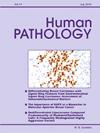三阴性小叶性乳腺癌:关注病理和临床挑战。
IF 2.6
2区 医学
Q2 PATHOLOGY
引用次数: 0
摘要
三阴性浸润性小叶癌是一种罕见且特征不明确的乳腺癌亚型,与更常见的三阴性浸润性导管癌不同。虽然三阴性浸润性导管癌通常被认为具有侵袭性临床行为和缺乏靶向治疗选择,但三阴性浸润性小叶癌具有独特的组织病理学和分子特征,可能影响其预后和治疗反应性。尽管存在这些差异,三阴性浸润性小叶癌的研究仍然很少,导致依赖于导管组织型的治疗策略,这可能无法完全解决其生物学复杂性。本文旨在通过分析三阴性浸润性小叶癌的临床病理特征、预后因素和新兴的治疗方法,对其进行全面的综述。我们探讨了三阴性浸润性小叶癌中常见的遗传改变,它们对治疗选择的潜在影响,以及当前管理策略中的挑战。此外,我们讨论了需要专门的研究工作和临床试验,以更好地确定治疗范例。随着精准肿瘤学的不断发展,了解三阴性浸润性小叶癌的生物学特征对于优化患者预后和制定更有效的治疗策略至关重要。本文章由计算机程序翻译,如有差异,请以英文原文为准。
Triple-negative lobular breast cancer: focus on pathology and clinical challenges
Triple-negative invasive lobular carcinoma is a rare and under-characterized subtype of breast cancer, distinct from the more common triple-negative invasive ductal carcinoma. While triple-negative invasive ductal carcinoma is generally recognized for its aggressive clinical behavior and lack of targeted treatment options, triple-negative invasive lobular carcinoma presents unique histopathological and molecular features that may influence its prognosis and therapeutic responsiveness. Despite these differences, triple-negative invasive lobular carcinoma remains poorly studied, leading to a reliance on treatment strategies adapted from ductal histotype, which may not fully address its biological complexities.
This review aims to provide a comprehensive overview of triple-negative invasive lobular carcinoma by analyzing its clinicopathological characteristics, prognostic factors, and emerging therapeutic approaches. We explore the genetic alterations commonly observed in triple-negative invasive lobular carcinoma, their potential implications for treatment selection, and the challenges in current management strategies. Furthermore, we discuss the need for specialized research efforts and clinical trials to define treatment paradigms better. As precision oncology continues to evolve, understanding the biological distinctions of triple-negative invasive lobular carcinoma will be essential for optimizing patient outcomes and developing more effective treatment strategies.
求助全文
通过发布文献求助,成功后即可免费获取论文全文。
去求助
来源期刊

Human pathology
医学-病理学
CiteScore
5.30
自引率
6.10%
发文量
206
审稿时长
21 days
期刊介绍:
Human Pathology is designed to bring information of clinicopathologic significance to human disease to the laboratory and clinical physician. It presents information drawn from morphologic and clinical laboratory studies with direct relevance to the understanding of human diseases. Papers published concern morphologic and clinicopathologic observations, reviews of diseases, analyses of problems in pathology, significant collections of case material and advances in concepts or techniques of value in the analysis and diagnosis of disease. Theoretical and experimental pathology and molecular biology pertinent to human disease are included. This critical journal is well illustrated with exceptional reproductions of photomicrographs and microscopic anatomy.
 求助内容:
求助内容: 应助结果提醒方式:
应助结果提醒方式:


